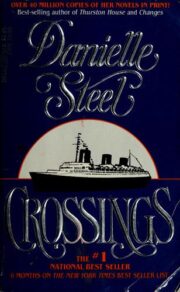“I don't need to. I know what you are. And you're as rotten as I am.”
“Good.” He pulled her gently backward by her hair and kissed her mouth and then bit it. “Then maybe we deserve each other.” He didn't want to admit it to her, but he was more taken with her than he had planned to be. He had thought in New York that it would be an amusing affair for the summer. She had almost openly invited him to meet her in France. But she had thought then that she couldn't have him, and it intrigued them both that having spent the summer with him she still wanted him now. “Maybe I will stay in Paris for a while.” The idea of a month at the George V pleased him, and he wasn't really worried about a war. “Tell you what, I'll drive you up myself the first of next week. Will that do, or do you think Nick will come racing down here for you before that?”
“Not likely.” She smiled. “He's too busy with Johnny, our son, and his business.”
“Good. Then we'll go home when we're ready. I'll call the hotel tomorrow and see if I can get my usual suite.”
She left him then to finish dressing for the party, and when she emerged from the dressing room they were sharing, he whistled loudly. She was wearing a red organza dress almost cut to her navel in front. It barely hung to her body by a thread, and he loved it. He loved it so much that with one evil look, and a leer, he tore it right off her body and threw her on the bed, pressing his body against hers, and taking her with such force that it left her panting and breathless, with no thought at all for the thousand-dollar creation from Dior that lay in shreds beside her.
And on this same Sunday afternoon at the Place du Palais-Bourbon, on the Left Bank, Liane and the girls waited for Armand to come home. He had had to work all through the weekend, but there was an aura of unexpected calm about him now. Everything was moving into action. In the streets, there were posters everywhere with the words APPEL IMMÉDIAT, calling men into the army. The girls had seen the signs everywhere on their way home from the park, and Liane had tried to keep them informed of what was going on. Their father no longer had time to. Elisabeth was still too young to understand very much, and she was desperately afraid of guns, but Marie-Ange was greatly intrigued with what was happening. There were other posters in the streets too, which she read aloud to her nurse and her sister, giving instructions in the event of a possible gas attack, and telling civilians about car headlights and house lamps during blackouts. The night before, Paris had been only partially illuminated.


"Crossings" отзывы
Отзывы читателей о книге "Crossings". Читайте комментарии и мнения людей о произведении.
Понравилась книга? Поделитесь впечатлениями - оставьте Ваш отзыв и расскажите о книге "Crossings" друзьям в соцсетях.